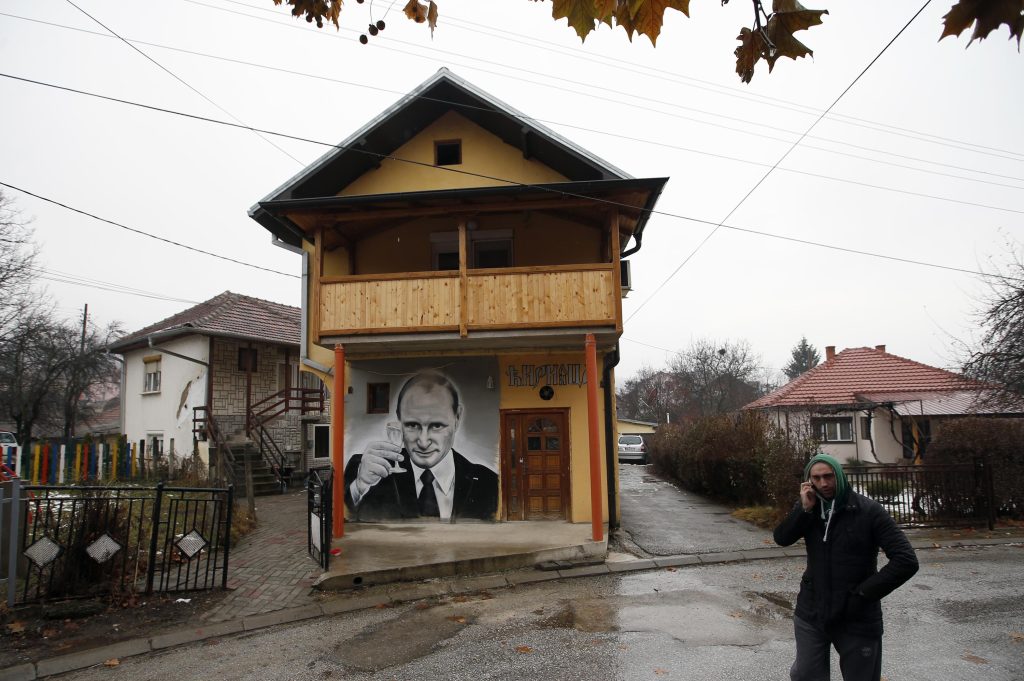Belgrade, Serbia (AP) – For some European countries watching Russia’s brutal war in UkraineThere are fears that they might be next.
Most vulnerable, Western officials say, may be those who are not members of NATO or the European Union, and therefore alone and unprotected – including Ukraine’s neighbor, Moldova and Russia’s neighbor, Georgia, both of which were formerly part of the Soviet Union – along with the Balkan states of Bosnia and Kosovo.
But analysts warn that even NATO members, such as Estonia, Latvia and Lithuania, may be at risk. On the cusp of Russia, as well as Montenegro, either from direct military intervention by Moscow or attempts at political destabilization.
Russian President Vladimir Putin “said from the start that it’s not just about Ukraine,” said Michal Baranowski, director of the Warsaw office of the German Marshall Fund.
“He told us what he wanted to do as he listed his demands, which included a change of government in Kyiv, but he was also talking about the eastern wing of NATO and the rest of Eastern Europe,” Baranovsky told The Associated Press. in an interview.
While Ukraine is firmly resisting the two-week-old Russian offensive, “It is not clear now how he will implement his other objectives,” Baranovsky said.
But the Biden administration is well aware of deep-seated fears in Eastern and Central Europe that the war in Ukraine may be just a prelude to broader attacks on former members of the Warsaw Pact in an effort to restore Moscow’s regional hegemony.
“Russia will not stop in Ukraine,” said EU foreign policy chief Josep Borrell.
“We are concerned about the neighboring countries, Moldova, Georgia and the Western Balkan countries,” he said. “We have to keep an eye on the Bulgarian West, particularly Bosnia, which may face destabilization from Russia.”
A look at the regional situation:
Moldova
Like its neighbor Ukraine, the former Soviet Republic of Moldova has a separatist insurgency to its east in the disputed region known as the Trans-Dniester, where 1,500 Russian soldiers are stationed. Although Moldova is militarily neutral and has no plans to join NATO, it officially applied for EU membership when the Russian invasion began in a swift attempt to bolster its relations with the West.
The country of 2.6 million people is one of the poorest in Europe, and hosts tens of thousands of Ukrainians who have fled the war. The invasion sparked growing fears in Moldova, not only because of the humanitarian crisis, but also because of fears that Putin might try to link separatists east of the Dniester River to Ukraine via the last strategic port of Odessa.
US Secretary of State Anthony Blinken visited Moldova last week and pledged: “We stand with Moldova and any other country that might be threatened in the same way.”
Moldovan President Maya Sandu said there was no indication yet that Russian forces in the Trans-Dniester had changed their stance, but stressed that concern remained.
“In this area now there is no possibility for us to feel safe,” Sandu said.
___
Georgia
War between Russia and Georgia broke out in August 2008 when Georgian government forces unsuccessfully attempted to regain control of the Moscow-backed breakaway province of South Ossetia. Russia defeated the Georgian army in five days of fighting and hundreds were killed. Subsequently, Russia recognized South Ossetia and the breakaway region of Abkhazia as independent states and strengthened its military presence there.
The Western-leaning government of Georgia condemned the Russian invasion of Ukraine, but did not show the same solidarity that Kyiv had during the war between Georgia and Russia. Authorities have prevented hundreds of Georgian volunteers from joining an international brigade fighting Russia in Ukraine.
Georgia’s seemingly neutral stance has shown thousands of people marching through the night in central Tbilisi in solidarity with Ukraine. Last week, Georgia’s government applied for EU membership just days after declaring it would not speed up its application as fears of a Russian invasion grew.
___
Baltic
Memories of Soviet rule are still present in Latvia, Lithuania and Estonia. Since the invasion of Ukraine, NATO has moved quickly to bolster its troop presence in the eastern allies, while Washington has pledged additional support.
For residents of the Baltic states—particularly those old enough to live under Soviet control—the tensions preceding the February 24 invasion brought to mind deportations and mass persecution. The three countries were annexed by Joseph Stalin during World War II and only regained their independence with the dissolution of the Soviet Union in 1991.
They joined NATO in 2004, placing themselves under the military protection of the United States and its Western allies. They say it is necessary for NATO to show resolve not only with words, but with soldiers on the ground.
“Russia always measures military strength but also the will of countries to fight,” said Janis Garissens, State Secretary of the Latvian Ministry of Defense. “Once they see a weakness, they will exploit that weakness.”
Blinken, who visited the Latvian capital Riga on Monday, said the Baltic states had “formed a democratic wall that now stands against the tide of authoritarianism” being pushed by Russia in Europe.
___
Balkans
It would be difficult for Russian forces to reach the Balkans without involving NATO forces stationed in all the neighboring countries. But Moscow could destabilize the region, as it already does, with the help of its ally Serbia, which has been arming it with tanks, advanced air defense systems and warplanes.
The Kremlin has always considered the region its sphere of influence even though it was never part of the Soviet bloc. A devastating civil war in the 1990s left at least 120,000 dead and millions homeless. Serbia, the largest country in the Western Balkans, is generally blamed for starting the war by brutally trying to prevent the breakup of Serb-led Yugoslavia — a move that resembles Moscow’s current efforts to pull Ukraine back into its orbit by military force.
There are fears in the West that the pro-Moscow Serbian leadership, which has refused to join international sanctions against Russia, might try to use the focus on Ukraine to further destabilize its neighbors, particularly Bosnia, where the Serb minority threatens to split. Their lands from the common union to join Serbia. Serb officials have repeatedly denied that they are interfering in neighboring countries, but have given tacit support to the separatist movements of Bosnian Serbs and their leader Milorad Dodik.
The Russian embassy in the Bosnian capital Sarajevo warned last year that if Bosnia took steps toward joining NATO, “our country will have to respond to this act of aggression.” She added that joining NATO would force Bosnia to take a stand in the “military-political confrontation”.
The European Union peacekeeping force in Bosnia has announced the deployment of about 500 additional troops to the country, citing “deteriorating international security (which) has the potential to spread instability”.
Kosovo, which seceded from Serbia in 1999 after a NATO air war against Serbian forces, has asked the United States to set up a permanent military base in the country and speed up its integration into NATO after Russia’s invasion of Ukraine.
“The acceleration of Kosovo’s membership in NATO and the presence of a permanent base for US forces is an urgent need to ensure peace, security and stability in the Western Balkans,” Kosovo Defense Minister Armind Mihaj said on Facebook.
Serbia said the move was unacceptable.
More than 100 countries, mostly Western countries, have recognized Kosovo’s 2008 declaration of independence, but not by Russia or Serbia.
Montenegro, a former ally that turned its back on Russia to join NATO in 2017, has imposed sanctions on Moscow over the war in Ukraine and is seen as next in line in the Western Balkans to join the European Union. The country is divided between the pro-Western policies and the pro-Serb and pro-Russian camps, raising tensions.
Russia has repeatedly warned the pro-Western president of Montenegro, Milo Djukanovic, who led the small Adriatic state to NATO, that this move is illegal and without the consent of all Montenegrin citizens.
Russia may eventually hope to improve its relations with Montenegro in an effort to strengthen its presence in the Mediterranean.
___
Stephen McGrath in Bucharest, Romania, Matthew Lee in Washington, Sabina Nikic in Sarajevo and Bosnia and Herzegovina, and Lazar Semeni in Tirana, Albania contributed to this report.
___
Follow the AP’s coverage of the war in Ukraine at https://apnews.com/hub/russia-ukraine

“Writer. Evil travel maven. Avid creator. Proud beer expert. Music lover. Explorer.”











More Stories
Jake Sullivan meets Yang Jiechi in Luxembourg, paving the way for a possible meeting between Biden and Xi
The CDC adds 3 places to its “high” risk list, including Mexico and the United Arab Emirates
Wordle 359 June 13 – Struggling with Wordle today? THREE CLUES TO HELP ANSWER | Games | entertainment